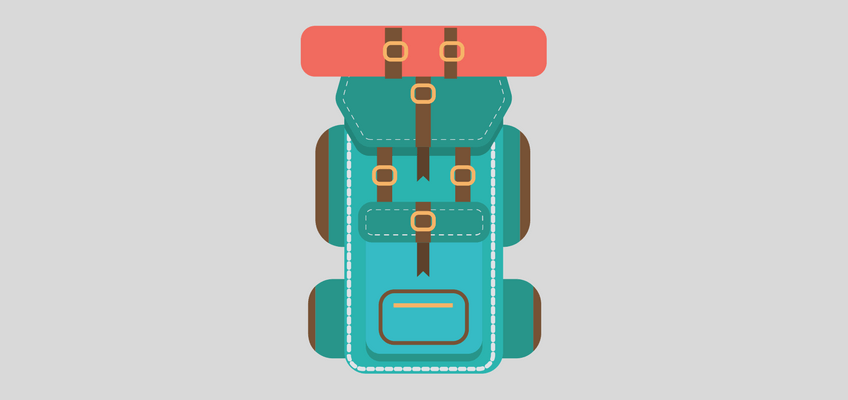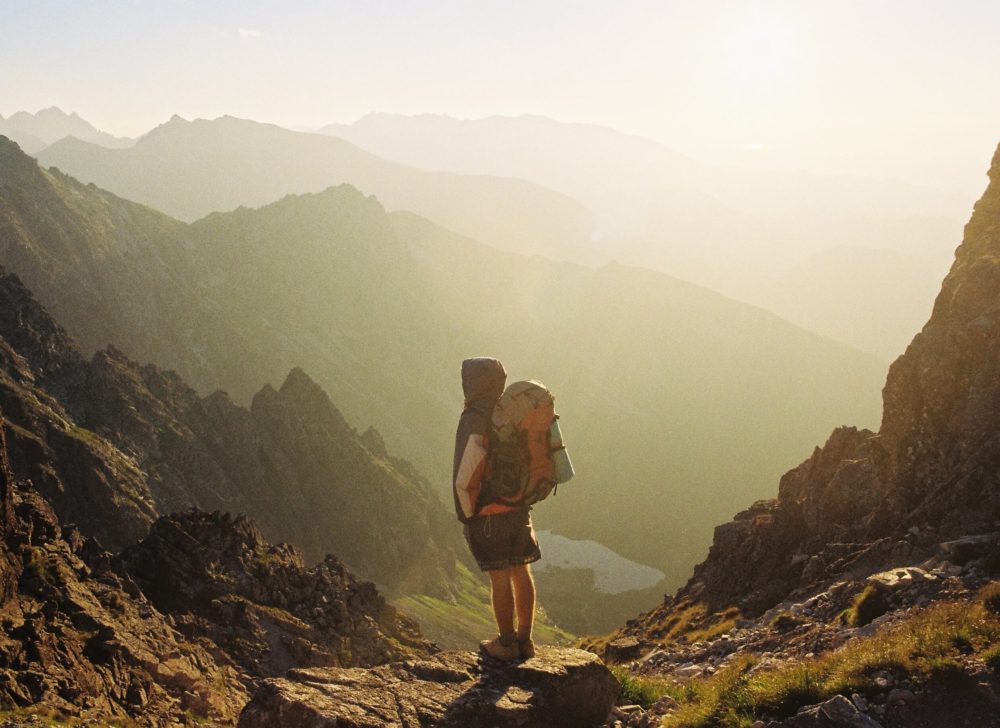
Summer is high season for backpacking, camping, and hiking, but few things can ruin an outdoor getaway like feeling unwell. Whether you catch a common cold, collect scrapes and bruises, or eat something that doesn’t sit right, it’s important to have a backpack stocked with the right supplies to both relieve symptoms and aid recovery.
Putting together a backpacking essentials kit tailored to your destination and needs is easy; if you’re a frequent backpacker as well as traveler, it’s useful to keep two separate kits in your luggage and customize them for the activity at hand. Be sure to restock them as soon as you return from a trip, including refilling any prescriptions.
Backpacking Essentials Infographic
Find a First Aid Kit That Fits
You can purchase a ready-made kit from REI or other outdoor retailers and customize it as needed, or invest in an inexpensive waterproof, zippered pouch of the appropriate size. Many companies sell small, backpacker-size first-aid kits, which sometimes come with miniature wilderness medical manuals.
Start with the Basics
Every travel first aid kit should contain the following backpacking essentials:
- Various sizes of bandages
- Surgical tape (to strap sprains and hold wound dressings in place)
- Gauze pads
- Antibiotic ointment
- Alcohol wipes
- Moleskin (for blisters and chafing
- Needles or a travel sewing kit (for blisters)
- Tweezers and sharp nail scissors (to remove splinters, insect stingers and to cut surgical tape)
- A thermometer (if you develop a sustained fever of 100.4 or higher, it’s time to seek medical attention)
- Matches (to sterilize a needle. Store them in an old prescription bottle.)
While alcohol wipes are ideal for short trips, they can dry out in the package. A bottle of antibacterial hand sanitizer is also essential for travel, particularly in the backcountry and developing nations.
Over the Counter Drugs
Over-the-counter drugs every kit should at least contain include:
- Hydrocortisone cream
- Anti-nausea/indigestion tablets
- Antihistamines
- Ibuprofen
- Eye drops
Women should also consider packing Uristat and a prescription for UTI’s and yeast infections.
Misc. Items to Keep You Healthy
Purchase a water filter or purifier suited to your needs- you’ll want something capable of straining out critters endemic to your destination (some microorganisms, like Leptospirosis, won’t get filtered out by basic purifiers).
To aid against possible traveler’s diarrhea you’ll want to stash DiaResQ in your pouch. DiaResQ is a food for special dietary use that provides important nutrients for people with diarrhea. It also relieves diarrhea fast so while you are traveling you don’t need to constantly find a bathroom (or worse, a hole in the middle of the jungle).
In addition, you’ll need electrolyte powders or tablets. While you’re exerting yourself, it’s critical to replenish electrolytes to avoid dehydration and heatstroke. Another great product to carry is electrolyte gummies or gels to snack on if you’re hiking or in extreme heat- Honey Stinger makes delicious products free of artificial ingredients.
Prescription drugs
In addition to any regular prescriptions (be sure you get a vacation override and stock up if you’re going on a long trip or delays are possible), ask your primary care or travel doctor for emergency prophylactic antibiotics you might require- this is particularly important if you’re going to be backpacking in developing nations. Note that it’s best not to self-diagnose or take antibiotics unless they’re absolutely necessary. Here’s your crash course for types of antibiotics.
- Cipro – pricey, but effective against most serious bacterial infections
- Doxycycline – a less expensive, less hardcore drug for bacterial infections, or for use in combination with other drugs for amoebic infections.
- Flagyl (metronidazole) – used for anaerobic bacterial, fungal and certain parasitic infections.
If you’re traveling out of the country, keep these meds in their original bottles, and carry copies of your prescriptions with you. Never share prescription drugs.
Useful add-ons
A compact mirror is invaluable if you get something in your eye or obtain a facial injury. It can also be used to signal for help if you’re lost.
Arnica or other pain-relieving gels soothe sore muscles and sprains or strains.
Even if you or your companions don’t suffer from any known allergies, you never know what can trigger a reaction, especially when you’re traveling abroad or backpacking. Talk to your doctor about a prescription and proper use, as an EpiPen can save a life.
Get Organized
Instead of trying to cram all of your backpacking essentials in your kit, portion out meds according to how long you’ll be gone. Keep OTC drugs in labeled containers (old prescription bottles are ideal; cover them with plain white labels and write down the contents, dosage and date); bandages and the like can be sealed in zip lock bags. Wrap tubes of ointment and creams in zip lock bags as well, in case they explode due to air pressure, altitude or heat.
Before You Go

By its very nature, backpacking means you’re likely to be far from both medical attention and supplies, so it’s best to purchase everything you’ll need beforehand. Campgrounds and convenience stores carry limited medical supplies, but they’ll do in a pinch for basic OTC drugs, bandages, matches, and ice packs (fill zip lock bags with crushed ice if you can’t find the latter).
Fill regular and prophylactic prescriptions at home; in some countries, you can purchase prescription drugs over-the-counter, but there’s no way of knowing what’s actually in them, so caveat emptor.
Stock up on DiaResQ, bottled water, and electrolyte power or tablets and stash them in your daypack so they’re handy in an emergency, whether you’re on a bus, plane or train, or on the trail.
Backpacking is a wonderful, once-in-a-lifetime experience for many. To stay healthy during and after your trip, pack these backpacking essentials. Safe travels.


